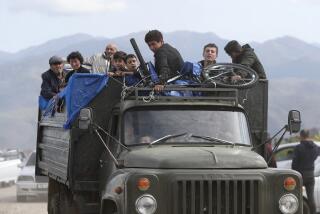Uzbek Officials Deny Charges of Civilian Deaths
- Share via
MOSCOW — The Uzbek government and its critics engaged in a fierce verbal battle Tuesday over last week’s bloody crackdown against thousands of protesters and armed militants in the eastern city of Andijon.
The country’s prosecutor general, Rashid Kadyrov, at a news conference in Tashkent, the capital, rebutted numerous accounts from Andijon that unarmed residents who had joined the Friday protests were among the dead.
“A number of hostages were killed, including three women and two minors,” Kadyrov said in comments reported by the Russian news agency Interfax. “Law enforcement agencies did not shoot at peaceful civilians. Everyone who was killed had weapons.”
Kadyrov said 169 people had died, including 32 law enforcement officers.
Human rights activists, however, continued to place the death toll at 300 to 500, and some claimed that many more people were killed elsewhere in the region during the weekend.
President Islam A. Karimov, speaking at the same news conference, attacked foreign media coverage of the clashes in Andijon.
“The large-scale media campaign is nothing but an attempt to anticipate results of an official investigation, draw a picture that would make an imprint on people’s minds, and claim that Uzbekistan has a tyranny and despots who execute civilians,” Karimov said in comments reported by Itar-Tass, a Russian news agency.
Nigara Khidoyatova, head of the Free Peasants Party, an opposition group not formally registered, said in a telephone interview from Tashkent that her organization’s supporters were assembling a list of people killed in the unrest in Andijon and other nearby parts of eastern Uzbekistan.
So far they had counted 745 people dead, including 203 people shot in Pakhtabad on Saturday, she said.
“People feel hatred toward that regime,” Khidoyatova said. “So when all the funeral ceremonies are over, the people there will mobilize themselves for a fight. That will be the beginning of the end of Karimov’s regime.”
The claims of either side could not be verified. Accounts from witnesses in Andijon, and reports from correspondents with Western wire services, suggested that many unarmed residents participating in the protests had been killed. Witnesses told Western media, including the Los Angeles Times, that many armed militants had joined in the clashes.
There was no confirmation of major violence in Pakhtabad, though rumors of a clash persisted. Andrei Babitsky, a Russian reporter for U.S.-funded Radio Free Europe/Radio Liberty who visited the Pakhtabad area Monday, said in a telephone interview that he was convinced no such incident had occurred there.
The events in Andijon included a predawn assault on a prison by armed fighters who freed inmates, including 23 prominent local businessmen who were on trial for allegedly being Islamic extremists.
By all accounts, most of those killed died later in the day, when Uzbek troops retook a government building seized by militants.
At that time, witnesses said, troops fired on crowds of thousands of protesters, including some who were armed. Religious “extremism,” although ill-defined, is illegal in Uzbekistan. The law has been used to clamp down on fundamentalist Muslim groups operating outside the system of state-regulated mosques.
Human rights groups had condemned the proceedings against the 23 businessmen, who are well-respected in Andijon. Some observers suggested that they may have been targeted for prosecution partly because they had set up an Islamic charity, which the government may have seen as a challenge to its authority.
Khidoyatova said she did not know who organized the attack on the prison. “The attack itself was done secretly, and how it was done is not clear for us,” she said.
“It was really strange, because it was well-organized, all the prison guards were shot, and no one survived. Certainly, there is a possibility that it was a provocation.... I don’t think that it was the relatives of prisoners who did it.”
In a statement Monday, State Department spokesman Richard Boucher condemned “the indiscriminate use of force against unarmed civilians.”
President Karimov responded to the comment at Tuesday’s news conference, declaring that Boucher “should apply the same principles to himself and his country if you take into account those wars the U.S. government takes part in.”
The United States maintains a military base in Uzbekistan that is used to support its operations in Afghanistan, and the Bush administration considers the Central Asian country of 26 million an important ally.
Some observers suggested that recent events could strain U.S.-Uzbek ties and lead Tashkent back into a closer relationship with Russia.
Mikhail Margelov, chairman of the foreign affairs committee of the upper house of the Russian parliament, told Itar-Tass that the clashes in Andijon and the U.S. response were likely to have wide-ranging geopolitical repercussions.
“The current events will make Islam Karimov’s government speed up the review of geopolitical priorities in favor of Russia,” Margelov said.
Uzbekistan has been one of the most pro-American states in Central Asia, but it will now feel that the United States “could not or did not want to protect Karimov’s government from a threat,” he said.
“Tashkent will begin looking for other partners that can ensure regional stability.”
Talib Yakubov, head of the Human Rights Society of Uzbekistan, said in a telephone interview from Tashkent that further protests were inevitable.
“People will express discontent,” he said. “I cannot say whether it will be peaceful or not peaceful. People will be on the streets and they will protest. In Andijon, the authorities have shown how they may act in the future.”
More to Read
Sign up for Essential California
The most important California stories and recommendations in your inbox every morning.
You may occasionally receive promotional content from the Los Angeles Times.









